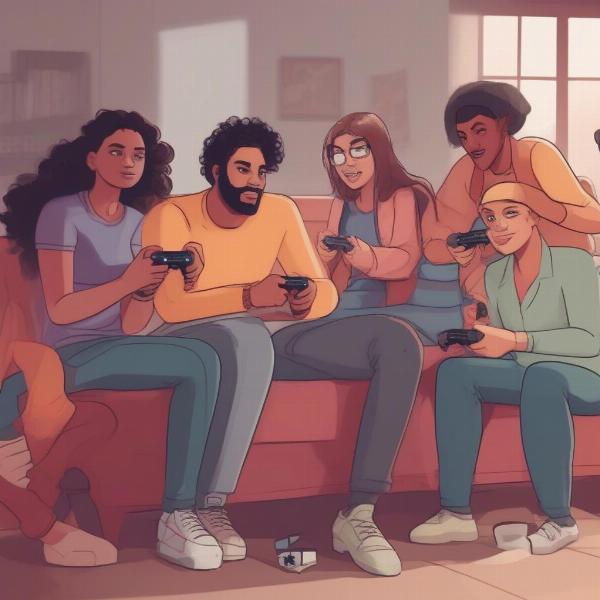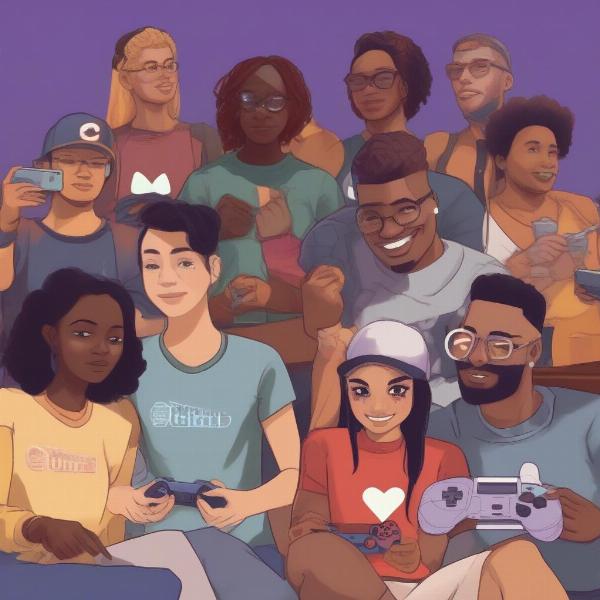The age-old question: Are Men Better At Video Games? It’s a debate that’s raged across forums, fueled countless online arguments, and sparked more than a few real-world disagreements. But is there any truth to the claim, or is it just another tired stereotype?
It’s tempting to fall back on generalizations, but the reality is far more nuanced than a simple “yes” or “no.” While biological differences might play a minor role, the answer lies primarily in a complex interplay of societal expectations, access to resources, and ultimately, practice. This exploration delves into the science, the social dynamics, and the skills that truly determine gaming prowess.
Exploring the Biological Factors
Some studies suggest minor biological differences in spatial reasoning and reaction time, potentially giving men a slight edge in certain game genres. However, these differences are often negligible and easily overcome with practice. It’s like saying men are inherently better at basketball because they’re statistically taller. While height can be an advantage, it doesn’t guarantee success. Skill, training, and dedication are far more crucial, just as they are in gaming. The same principle applies to video games.
A more compelling explanation lies in how society shapes gaming habits from an early age. Boys are often encouraged to play video games, given consoles and controllers as gifts, and exposed to a culture that celebrates competitive gaming. This early exposure translates into more experience, leading to honed reflexes and strategic thinking. Girls, on the other hand, may face societal pressures to pursue other interests, limiting their early access and practice time.
 Men and Women Playing Video Games Together
Men and Women Playing Video Games Together
The Impact of Socialization and Access
Societal expectations significantly impact gaming habits and skill development. Consider how boys are often gifted video games and encouraged to engage in competitive play from a young age. This early introduction fosters a culture of practice and skill development, which can lead to a perceived advantage later on. Similarly, the prevalence of male protagonists and narratives in many popular video games can create a sense of belonging and identification for male players, further fueling their engagement and investment in the gaming world. Think about how early exposure to sports can shape athletic abilities. The same applies to gaming.
Access to resources also plays a crucial role. Historically, gaming communities and professional esports scenes have been predominantly male-dominated. This can create barriers to entry for female gamers, limiting their opportunities for mentorship, competitive practice, and community support. However, this landscape is evolving, with more and more women entering the professional gaming scene and challenging traditional gender roles. Similar to how access to quality coaching can impact an athlete’s performance, the availability of resources and support networks significantly influences a gamer’s development. For those interested in selling their old video games, our guide on how to sell old video games offers valuable tips and strategies.
Skill, Practice, and the Myth of Inherent Ability
Ultimately, skill in video games boils down to practice, strategy, and dedication, regardless of gender. While early exposure and societal encouragement might give some individuals a head start, it doesn’t preclude anyone from achieving mastery. Countless female gamers have proven this, excelling in various genres and demonstrating exceptional skill. The notion of inherent male superiority in gaming simply doesn’t hold up under scrutiny. Just as with any other skill, consistent effort and strategic practice are the keys to improvement. Wondering about the length of NCAA football games? Our article on how long do ncaa football games last provides a comprehensive breakdown.
 Female Gamer Winning Esports Tournament
Female Gamer Winning Esports Tournament
Debunking the Stereotypes: Women in Esports
The rise of women in esports is a powerful testament to the fact that skill and dedication trump any perceived biological advantages. Professional female gamers are shattering stereotypes and demonstrating exceptional talent in various competitive titles. Their success not only challenges the notion of male dominance but also inspires a new generation of gamers, regardless of gender. This growing representation is crucial, fostering a more inclusive and diverse gaming community. It’s similar to how women’s participation in traditionally male-dominated sports has challenged perceptions and broadened opportunities. If you’re curious about PlayStation compatibility, our post on does playstation 2 play playstation 1 games provides a detailed explanation.
Beyond the Binary: A More Inclusive Future for Gaming
The conversation around gender and gaming needs to move beyond simplistic comparisons. Instead of focusing on who’s “better,” we should strive to create a more inclusive and welcoming environment for everyone. This means challenging stereotypes, promoting diversity, and celebrating the achievements of all gamers, regardless of gender. By fostering a culture of support and encouragement, we can unlock the full potential of the gaming community and create a truly level playing field.
 Diverse Group Gaming Online
Diverse Group Gaming Online
Is There a Difference in Game Preference Between Men and Women?
While there’s no inherent difference in skill based on gender, there are some observed trends in game genre preferences. For instance, statistically, more men tend to gravitate towards competitive first-person shooters and strategy games, while women may lean towards narrative-driven RPGs and simulation games. However, these are just trends, and countless exceptions exist. Ultimately, individual preferences trump any generalized assumptions. For issues with Epic Games, you might find our article on how long does it take for epic games to respond helpful.
The Future of Gaming: Skill Over Gender
The future of gaming lies in celebrating skill, dedication, and passion, regardless of gender. As the industry evolves and becomes more inclusive, the archaic notion of men being inherently better at video games will continue to fade. The focus will shift towards individual talent and the fostering of a diverse and welcoming community where everyone can thrive. Interested in competitive fitness? Check out our article on how to qualify for crossfit games.
Conclusion
So, are men better at video games? The answer is a resounding no. While societal factors and early exposure might have historically created a perceived advantage for some, skill in gaming ultimately comes down to practice, strategy, and passion. As the gaming landscape becomes increasingly diverse and inclusive, we can look forward to a future where talent and dedication, not gender, determine success. Share your thoughts and experiences in the comments below! Let’s continue this important conversation.

